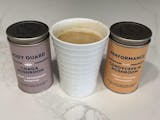Reishi: A Natural Sleep Aid | MoguMushrooms.com
Reishi and its Activity Against Diseases
Humans spend about one-third of their lives asleep, yet most individuals know little about sleep.
Sleep disorders can have a big impact on your life, and millions of people are living with them. They can make for frustrating nights, difficult mornings, and impaired function throughout the day. Good sleep is necessary for optimal health and can affect hormone levels, mood and weight. Common sleep problems include: sleep apnea, snoring, insomnia, sleep deprivation, narcolepsy, and restless legs syndrome.
Reishi, among many other things, is also commonly referred to for its sleep boosting abilities. According to the State Pharmacopoeia of the People's Republic of China (2000), Reishi is highly recommended for insomnia and shortness of breath seen in sleep apnea. Both Chinese and Japanese herbalists still use Reishi today for insomnia cases to what they refer to as “sleep-promoting factor". (1) Among having over 400 bioactive constituents, Reishi’s tranquilizing effect is due to its high amounts of GABA and TNF-alpha.
An animal study monitored sleep parameters using the SleepSign software after consumption of Reishi fruiting body extract. In just three days, the results suggest Reishi having hypnotic effects, with TNF-alpha significantly increasing total sleep time and non-rapid eye movement (NREM) sleep time. (2)
Another in-vivo study monitored the GABAergic effects of Reishi (water extract), suggesting long-term use of Reishi showed to significantly decrease sleep latency, increase sleeping time, non-REM sleep time and light sleep time. Classifying Reishi as a herb with sedative effects. (3)
Although these studies had no direct correlation to REM sleep, gaining sleep time and efficiency in the preliminary stages of sleep is a necessary phase in the transition to full REM sleep. (4)
In the field of Traditional Chinese Medicine, Reishi is also closely associated with soothing the nerves. Research shows that when patients consumed Reishi spores, it reportedly affected their nervous system, calming it down and therefore regulating their sleep cycle, with no reports of side-effects. (5)
Reishi has loads of clinical reports that supports its use with sleep disturbances, especially for those that have produced sleep disorders as a symptom to an even greater health complication. All kinds of health conditions affect the ability to sleep effectively, due to the severity of pain and discomfort associated with different health conditions. Herbalists have recommended Reishi for centuries to not only support a variety of health concerns, but to help patients sleep through difficult nights of discomfort.
Naturally the deeper and better you sleep, the better you recuperate from injury and stress. Altogether, this is a functional mushroom with a wide range of healing potential to offer.
Click on other conditions to continue exploring studies done on Reishi:
References:
1. The Sacred Mushroom “Reishi”-A Review. American-Eurasian Journal of Botany, 1 (3): 107-110, 2008. ISSN 1995-8951
2. https://www.ncbi.nlm.nih.gov/pubmed/22207209
3. https://www.ncbi.nlm.nih.gov/pubmed/17383716
4. https://www.ncbi.nlm.nih.gov/books/NBK19956/
5. https://www.ncbi.nlm.nih.gov/pubmed/27910768

